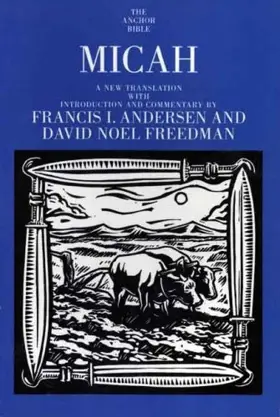

Micah
Pages
664
Publisher
Yale University Press
Published
1/1/2000
ISBN-13
9780300139723
One of the twelve Minor Prophets, Micah unwaveringly spoke God’s message to Israel—a message filled with judgment but also laced with the promise of redemption. Micah combined poetic complexity and literary sophistication to compel his audience to respond. And now, through an exacting linguistic and literary analysis of the biblical text, coauthors Francis I. Andersen and David Noel Freedman explain what Micah meant to his contemporaries, as well as what his message means to readers today.
What sets Micah apart is the attention it pays to the details of the prophet’s original text. The commentary is descriptive rather than speculative, philological rather than theological. With unusual care, the authors—two of the world’s leading Bible scholars—examine the features of Micah’s biblical Hebrew and prophetic discourse. They discover the use of a special kind of language, which, in its poetic composition, differs significantly from the language of classical Hebrew prose.
At the zenith of their careers, masters of all relevant disciplines, Andersen and Freedman are the perfect duo to unlock the words of this challenging prophet.
What sets Micah apart is the attention it pays to the details of the prophet’s original text. The commentary is descriptive rather than speculative, philological rather than theological. With unusual care, the authors—two of the world’s leading Bible scholars—examine the features of Micah’s biblical Hebrew and prophetic discourse. They discover the use of a special kind of language, which, in its poetic composition, differs significantly from the language of classical Hebrew prose.
At the zenith of their careers, masters of all relevant disciplines, Andersen and Freedman are the perfect duo to unlock the words of this challenging prophet.
Collections
This book appears in the following featured collections.
- Best Exegetical Commentaries by Jim Rosscup
- Ultimate Commentary Collection: OT Technical by John Glynn
- Favorite Advanced OT Commentaries by Jeremy Pierce (parableman)
- Best Advanced OT Commentaries by Jason Gile
- Building an OT Commentary Library by Invitation to Biblical Interpretation (Kostenberger & Patterson)
- TGC: Scholarly Commentaries by The Gospel Coalition
Reviews
One of the most thorough treatments of the secondary literature on Micah available. Longman agrees, “The authors, both senior members of the guild of Old Testament studies, have thoroughly researched the book and also canvassed the secondary literature. The exegetical conclusions are not always satisfying, and the authors have little interest in broader theological issues, but for what it is, it is excellent.”
[Full Review]
Although written from a more critical perspective than Waltke, the commentary on Micah by Andersen and Freedman is worth consulting by those doing in-depth study of the book. The commentary, at 637 pages, is exhaustive, touching on every aspect of the book.
[Full Review]
An exhaustive exegesis of the canonical form with careful attention to structure.
[Full Review]


